City in Assam, India
| Golaghat | |
|---|---|
| City | |
 | |
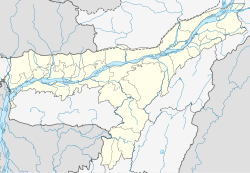  | |
| Coordinates: 26°31′N 93°58′E / 26.52°N 93.97°E / 26.52; 93.97 | |
| Country | India |
| State | Assam |
| Region | Upper – Assam |
| District | Golaghat |
| Settled | 20th century |
| Founded | 1839 |
| Consolidated | 1920 |
| Government | |
| • Type | Municipality |
| • Body | GMB |
| • District Commissioner | Pulak Mahanta, ACS |
| Area | |
| • Total | 17 km (7 sq mi) |
| Elevation | 95 m (312 ft) |
| Population | |
| • Total | 41,489 |
| • Rank | 18th in Assam |
| • Density | 3,500/km (9,000/sq mi) |
| Demonym | Golaghatian |
| Time zone | UTC+5:30 (IST) |
| PIN |
6 areas
|
| Telephone Code | +91 - (0) 3774 - XX XX XXX |
| ISO 3166 code | IN-GG |
| Vehicle registration | AS – 05 – XX – XXXX |
| Sex Ratio | 964 ♀️/ 1000 ♂️ |
| Climate | Cwa |
| Official Language | Assamese |
| Planning agency | 1 |
| Literacy Rate | |
| Lok Sabha Constituency | Kaliabor |
| Vidhan Sabha Constituency | Golaghat, Bokakhat, Sarupathar, Khumtai, Dergaon |
| Website | golaghat |
| India Post delivery offices. | |
Golaghat (English: /ˈɡoʊlɑːɡhɑːt/ Gʊlaɡʱat ['ɡʊlaɡʱat] ) one of the largest subdivisions of the Indian state of Assam, later elevated to the position of a full–fledged district headquarter on 5 October 1987, is a city and a municipality and the seat of administrative operations of Golaghat district, besides being a twin city to Jorhat which is about 55 km away. It is one of the oldest urban areas in Assam that recently featured on the Smart Cities nominations list, along with Guwahati and four other prominent urban areas of the state; although losing out to Guwahati at the final stage. The Dhansiri, one of the tributaries of the Brahmaputra, passes through Golaghat and is the primary water source for its citizens.
One of the earliest tea urban centres in Assam that has been the headquarters of the oldest subdivision for over 187–188 years since 1839, the local government body, Golaghat Municipal Board (GMB), was set up in early 1920, becoming a long-established civic body of the state, formed before independent India. It is a historical body of 106–107 years of age in continuous operation.
Golaghat has the inceptive post/mail service and telegraphic communication systems in Assam going back to 1876. The oldest social – literature/rhetorical congresses of Assam – the Golaghat Sahitya Sabha of Asam Sahitya Sabha, also began here in 1918. The Golaghat Amateur Theatre Society (GATS), one of the premier theater societies of the state, was set up here in 1895 to uplift the dramatic and cultural activities in the region, particularly Golaghat. The Golaghat Bar Association (GBA), founded in 1891, is one of the oldest legal societies in Assam, especially in the Upper – Assam division.
Golaghat has a number of heritage buildings and sites – the Golaghat British Cemetery, constructed in 1876, the Bezbaruah Higher Secondary School, set up in the late 19th century in the year 1886 by the educationalist Dinanath Bezbarua, the Baptist Church founded by the American missionaries in 1898, the Christian High (Mission) School built by the American Women Foreign Mission Society in 1919, Assam's first department store – Doss & Co., constructed in 1930 and incorporated under the Registrar of Companies (RoC) – Shillong in the year 1955 to name a few.
The headquarters of Assam Valley Tea Planters' Association (now Assam Tea Planters Association) was also based in Golaghat. Set up in 1941 under Mahendra Nath Barooah's management, the erstwhile headquarters played a significant role in enrolling associate members, besides laying the first foundations of growth, recognition and reputation that the association is presently credited for. Golaghat also has one of the oldest boards of trades and industries in the state. The United Chamber of Commerce (UCC) formed in 1954 antecedes many newer chambers of commerce that have been set up in the state in the more recent years.
Assam's first major political party, the AGP was formed here and launched in the year 1985 at the historic Golaghat Convention and by 2008; the same members of the convention reunified the party at this place.
The place is also the headquarters of The North Eastern Tea Association (NETA), one of the tea growers' groups in the state of Assam, a constituent member of Consultative Committee of Plantation Associations (CCPA), Assam Valley branch.
Etymology
The name Golaghat (gola which means shop and ghat meaning the landing point of river ferry or enclosure for boats) originated from the shops established by the Marwari businessmen during the mid-20th century at the bank of Dhansiri river near present Golaghat.
There is another view, which is more sophisticated and older than the arrival of the British and Indian businessmen. During the Ahom kingdom era, there was a storehouse of cannonballs also locally called Gola and transported by local ferry Ghat, from which name Golaghat is derived.
History
9th century
The stone inscription of Nagajari-khanikar village of Sarupathar, dating back to the 5th century, reveals that there was an independent kingdom in Doyang – Dhansiri valley and the relics of ramparts, brick structures, temples and tanks etc. discovered in these areas suggest the presence of a kingdom during 9th and 10th century.
Kingdom of Mongmao
Main article: Möng Mao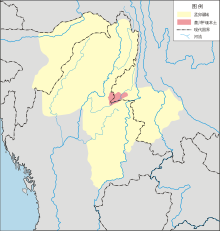
According to the Brief History of Mengguo Zhanbi, in 1318, Si Kefa after conquering southeast states till Lancang river from the Yuan dynasty, appointed his brother Sanlongfa as the general and led an army of 90,000 to attack the king of Mengwei Sari (Upper Assam) in the northwest. In the end, he designed a plan to make Mengwei Sari surrender and agreed to pay tribute every three years. In Hsweni state chronicle, the two generals Tao Sen Yen and Tao Sen Hai Khai sent with Samlongpha sent a story to Hso Khan Hpa (Si Kefa) at Mongyang that Samlongpha was conspiring with the king of Mong Wehsali Long to dethrone Hso Khan Hpa, Hso Khan Hpa believed the story and sent poison food to Samlongpha and he died at Mongkawng.
With Ming dynasty and Kingdom of Ava
Earlier, this part was ruled by the Dimasa Kingdom. The Ming dynasty had contact with the Dimasas and canonised the Dimasa kingdom as a tusi in 1406. The Ming court sent Zhou Rang, a Supervising Secretary to bestow Imperial orders, patent, seals, paper money, silks etc. to the kingdomand in return, the chieftain of Dimasa sent horses and local products as a sign of tribute. In 1425, paper money, ramie-silks, silk gauzes and thin silk were conferred to Mazhiasa who was sent to the Ming court by Diedaomangpa, the acting head of Di-ma-sa Pacification Superintendency.

It is speculated that Dimasa kingdom is referred to as Timmasala in the Yan-anng-myin pagoda inscription of Burma in 1400 A.D. In this inscription by Minkhaung I, the kingdom of Ava is said to extend on the east to Shan Pyi, northwest to Timmasala, west to Kula Pyi, and south to Talaing Pyi.

In a 1442 inscription from Pagan of Burma mentions Timmasala (Hill Kacharis) to be one of the 21 principalities under Mong Mao ruler Thonganbwa (1413–1445/6), who was later captured by the Governor of Taungdwin and presented to King Narapati I of Ava.
Under Ahoms
The Doyang – Dhansiri valley came under the rule of Ahom dynasty during the 16th century. During Ahom rule, this area was under Morongi-khowa Gohain, an administrative officer.
Early modern
In 1751, certain portions of Barpathar, Sarupathar Barangi mauzas of Golaghat circle and Duarbagari of Bokakhat circle were transferred to the United Mikir and N.C. Hills districts.
During the last phrase of the Ahom kingdom, when the independent sovereignty of Ahoms had come to an end, Purandar Singha was entrusted in 1833 with the administration of Upper – Assam by the East India Company who had already won mastery over Assam. However, this artificial ornamentation by the scion of Ahom Royal House was short-lived, and in the year 1838, the whole area was resumed by the authorities of the company and annexed to the British territory with the appointment of Col. Aham White as the political agent on 16 September during the same year.
By a proclamation in 1839, the British took possession of Assam and the area was divided into two districts of Lakhimpur and Sibsagar, where the Doyang – Dhansiri valley was included under the newly formed Golaghat subdivision of Sibsagar district in 1839. Golaghat became the largest subdivision in Assam and comprised Dergaon and Golaghat circles. Golaghat circle was the largest among them with 150.10 square miles of area, while Dergaon was the smallest. During this time, Purandar Singha continued to rule with Jorhat as the capital of his territory, Upper – Assam, but with the formation of two other subdivisions, one at Jaipur and the other at Golaghat.
On 18 December 1846, Jorhat was declared a subdivision comprising certain portions of Golaghat subdivision. The earliest head post offices of the Assam circle of British Assam were located in Golaghat besides Debrughur, Goahati, Jorhat, Nowgong, Sibsagar, Shillong and Tezpore.
Fountain at display in Golaghat View under pale lighting
View under pale lighting View under dark lighting
View under dark lighting
Much later after telegraph lines had been stretched between Calcutta and Guwahati in 1869; Golaghat got its speaking wires' system in and around 1876. The lines were stretched to connect Golaghat with Kohima, Shillong with Goahati, Sibsagar with Nazerah and Debrughur with Makum.
In British Assam, Golaghat derived its importance chiefly because of having advanced communication systems during that time and on account of its connection by road with Kohima. One of the oldest railway lines in Assam was also built in Golaghat. The text noted from the book Glimpse of Assam written by Mrs. S.R. Ward in 1884 state:
Mr Bryers who was then the Chief of Cachar and Assam Railway Survey succeeded in finding a railway route that would be carried up the Dhunsiri valley to Golaghat... thus giving Assam direct railway communication with Chittagong and Calcutta.
Late modern and contemporary
Golaghat elevated to the position of a full-fledged district in Assam comprising an area of 3,502 km (or 1, 352.13 sq. mi) on 5 October 1987 and is known for its notable contribution in India's independence movement, arts and culture, literature and sports in the region.
- Kushal Konwar, Kamala Miri, Dwariki Das, Biju Vaishnav, Sankar Chandra Barua, Tara Prasad Barooah, Maheshwar Barooah, Rajendra Nath Barua, Gaurilal Jain, Ganga Ram Bormedhi and Dwarikanath Goswami are Indian independence activists of the town.
- The 19th century writer, Hem Chandra Barua, who authored the first Assamese dictionary Hemkosh hailed from Golaghat.
- Ghanashyam Barua, a resident of this place, reckoned in the field of politics as the first Central Minister of Assam, translated William Shakespeare's The Comedy of Errors into Assamese along with three of his partners.
- Several national and international sportspeople in fields of athletics, table tennis, tennis, boxing and football have come from Golaghat.
- Numaligarh Refinery is the biggest revenue generating industrial sector in Golaghat.
Administration





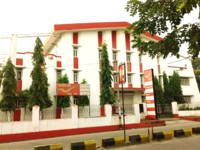 From top left to right:
From top left to right: Aaiferi Enclave (Amolapatty – New), Regional Office – Assam Rural Development Bank (Amolapatty – New), Vishal Mega Mart (Amolapatty – New), Head Post Office (Golaghat Central), BSNL Telephone Exchange – Outdoor Section (Golaghat Central), and Gold Cinema Multiplex Screen (Old Central Jail Market)
Local government
Main article: Golaghat Municipal Board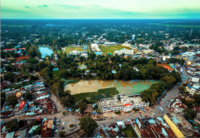 Golaghat – Central (west) skyline
Golaghat – Central (west) skyline Golaghat master-plan area
Golaghat master-plan area
The administration of Golaghat is formed of two tiers: a city-wide and a local tier. The city-wide administration is coordinated by the Golaghat Development Authority, while the local administration is carried out by the Golaghat Municipal Board. The development authority functions under the Directorate of Town and Country Planning – Urban Development Department, Government of Assam and is responsible for the implementation of infrastructure projects, besides preparation of master plan for Golaghat urban area to ensure distributed growth. The authority works closely with the municipal board.
The municipal board covers the geographical area of 17 square kilometres (6.6 sq mi) within Golaghat and has the administration over 9,646 houses to which it supplies basic amenities like water and sewerage, besides performing certain obligatory services as a part of the local administration.
The Deputy Commissioner of Golaghat is the executive head and is responsible for law and order, implementation of government schemes, besides being also authorised to hear revenue cases pertaining to the district.
The Chairperson of Golaghat is an elected representative who is accountable for the strategic governance of Golaghat headquarters. The Chairperson directs the elected Ward Commissioners in entirety of Golaghat on various civic matters.
The main functions include, but not limited to the following:
- Strategic planning, including housing, waste management, the environment and production of the Golaghat Master Plan
- Refuse or permit planning permission on strategic grounds
- Transport policy
- Fire and emergency planning, delivered by the functional body Fire & Emergency Services, Assam
- Policing and crime policy
- Economic development, delivered through the functional body Golaghat Development Authority
- Power to create development corporations
Neighbourhoods
This is a list of the areas of Golaghat, in alphabetical order. In political or administrative usage contemporary areas of Golaghat are informal, often being based on or adapted from historic contexts. For electoral purposes the areas are divided into wards.
The oldest borough in Golaghat is Amolapatty.
| Neighbourhoods |
|---|
| Old |
| Amolapatty – Old |
| Baagicha Ali |
| Amolapatty – New |
| Others |
| Arengapara |
| Bengenakhowa |
| Bet Mahal |
| Chandan Nagar |
| Chanmari |
| Geeta Nagar |
| Junaki Nagar |
| Krishna Nagar |
| Maruwaripatty |
| Missionpatty |
| Paltanpatty |
| Santipur |
| Subhash Colony |
| Sreemanta Nagar |
| Tapan Nagar |
| Tenpur |
| Suburbs |
| Moinapara |
| Narakanwar |
| Pulibor |
| Rangajan |
| Primarily a residential area. A commercial area. |
Geography
Scope
Golaghat is located at 26°31′N 93°58′E / 26.52°N 93.97°E / 26.52; 93.97. It has an average elevation of 95 metres (312 feet).
The Golaghat telephone area code (3774) covers a larger area, the entire Golaghat district, while the PINs 785 621 – 785 702 range from Golaghat H.O. (Head Post Office) to other regions, such as the sub–office delivery in Bengenakhowa, branch office in Missionpatty etc.
Status
Golaghat presently comprises the areas within the jurisdiction of Golaghat Municipal Board, however, the proposed planning covers an extended area of Golaghat Grant and Bengenakhowa Grant, besides the Amolapatty region.
Topography

Golaghat encompasses a total area of 17 square kilometres (6.6 sq mi), an area which has a population of ~ 60,000 and a population density of ~ 8,303.55 inhabitants per square kilometre (21,506.1 inhabitants/sq mi). Dhansiri River, one of the important tributaries of Brahmaputra River, is the primary geographical feature of Golaghat which is a navigable river and the main factor for the growth of human settlements in the region. The Dhansiri is a tidal river and Golaghat and surrounding areas are vulnerable to flooding.
Climate
Like most of the hill areas of Northeast India, Golaghat has a subtropical highland climate (Köppen Cwb) characterised by pleasant, dry and sunny winters and warm, humid and very wet summers.
Summer
The summer season is very warm and usually humid starting from the end of March and continuing until October. Golaghat falls within the temperate region with monsoon-type rainfall prevailing through the year. Summer days typically range from 20 to 24 °C (68.0 to 75.2 °F) but the humidity makes it feel hotter. South–west monsoons that lasts from June to September are responsible for a total average of 1,686 millimetres or 66.38 inches out of an annual total of 2,295 millimetres (90.35 in) of annual rainfall.
Winter
Winter commences from the month of November with less rainfall and misty mornings and afternoons. By December, afternoon temperatures are a pleasant 16 °C or 60.8 °F and mornings average 8 °C or 46.4 °F.
When compared with winter, the summers have much more rainfall.
| Climate data for Golaghat: Statistics from Dibrugarh/Mohanbari weather station (The data for averages are taken from year 2000 to 2012) | |||||||||||||
|---|---|---|---|---|---|---|---|---|---|---|---|---|---|
| Month | Jan | Feb | Mar | Apr | May | Jun | Jul | Aug | Sep | Oct | Nov | Dec | Year |
| Mean daily maximum °C (°F) | 15 (59) |
15 (59) |
17 (63) |
20 (68) |
20 (68) |
23 (73) |
22 (72) |
24 (75) |
23 (73) |
22 (72) |
19 (66) |
16 (61) |
19.7 (67.5) |
| Mean daily minimum °C (°F) | 8 (46) |
9 (48) |
13 (55) |
15 (59) |
16 (61) |
20 (68) |
18 (64) |
19 (66) |
18 (64) |
17 (63) |
12 (54) |
8 (46) |
14.4 (57.9) |
| Average rainfall mm (inches) | 30 (1.2) |
54 (2.1) |
57 (2.2) |
96 (3.8) |
210 (8.3) |
405 (15.9) |
510 (20.1) |
360 (14.2) |
411 (16.2) |
114 (4.5) |
21 (0.8) |
27 (1.1) |
2,295 (90.4) |
| Average rainy days (≥ 1.0 mm) | 6 | 10 | 13 | 17 | 18 | 21 | 24 | 22 | 20 | 11 | 4 | 4 | 170 |
| Source 1: | |||||||||||||
| Source 2: | |||||||||||||
Although located in the one of the environmentally clean regions of India, the recent studies of air pollution levels in Golaghat have suggest poor air quality in the region with harmful air particulate matter levels higher than the standards.
Architecture
Being one of the oldest municipal regions in Assam, Golaghat has many pre-independence style of bungalows in Assam–type architecture, the design style that has houses with high ceilings and light tin roof and wooden or concrete flooring. However, with time, such characteristic designs are replaced with RCC houses and buildings.
 Scenic skyline of Golaghat dominated with trees and bungalows
Scenic skyline of Golaghat dominated with trees and bungalows
Demography
| Religion in Golaghat (2011 census) | ||||
|---|---|---|---|---|
| Religion | Percent(%) | |||
| Hindu | 77.04% | |||
| Muslim | 19.01% | |||
| Christian | 1.70% | |||
| Sikh | 1.34% | |||
| Buddhist | 0.07% | |||
| Jainism | 0.39% | |||
| Other | 0.34% | |||
| Undeclared | 0.11% | |||
Previously in 2001 Census, Golaghat recorded a population of 33,021, constituting 53 percent males and 47 percent females of the total population, with 11 percent of the population under 6 years of age. The average literacy rate was noted to be 82%, higher than the national average of 59.5 percent, where male literacy stood at 84 percent and female literacy at 79 percent respectively.
In 2011 Census, Golaghat registered the lowest child sex ratio of 884 females per 1000 males, and the highest percentage of household-industry workers in the district at 4.98 percent. Males recorded a lower percentage than females at 2.57 males and 13.90 percent females respectively.
The Scheduled Castes and Scheduled Tribes were at 3.69 percent and 1.21 percent i.e., a total of 1,549 and 507 populations respectively and 3979 to be the total slum population in the city.
The 2001-literacy rate of 82 percent increased to 90.93 percent in 2011, with the highest number of literates in the district, but at the same time, reporting the highest number of illiterates with 7,637 persons.
The largest religious groupings of the census are Hindus (77.04 per cent), and the smallest are undeclared at 0.11 (per cent).
Economy

Golaghat Br.
EST 1937
The modern economy in Golaghat began with a system of organized banking that started in 1926 with a functioning branch of the Gauhati Bank. The years thereafter led to the establishment of other newer banks, namely; the Union Bank, a cooperative bank under the presidency of Debeshwar Rajkhowa in 1930 and the Comilla Banking Corporation Limited in 1937. Later, the merger of Comilla Banking Corporation Limited with Tripura Modern Bank Limited led to the formation of United Bank of India branch in 1950.
Golaghat is an agrarian economy, comprising cultivation of cash crop: tea, besides food crops, such as rice and sugarcane.
Tea industry
Golaghat has played a significant role in the tea industry of Assam and there is a saying that one can’t make bad tea in the Golaghat belt. The small tea growers' movement was also started from Golaghat. As per the latest statistics, Golaghat has the third highest number of small tea growers (STGs) and third highest number of bought leaf factories (BLFs) in Assam.
The region has sixty three large tea estates with a turnover of twenty thousand tonnes of tea per year. Small-scale tea growers that are based here have also provided considerable traction to the economy because of large incomes. The Golaghat-based organisation, NETA representing 32 tea producers contributing 75 million kg of tea, has planned to set up tea boutiques for the promotion and easy accessibility of fresh, non-blended authentic tea at reasonable prices to consumers. The Tea Board of India also organises period small tea growers conventions in Golaghat for understanding domestic trade challenges and providing strategic directions for the growth of the economy.
Heavy industry
The Numaligarh Refinery is the major heavy industry in the region processing three million tonnes of crude oil per year.
International Trade Centre
An international trade centre for the regulation and governance of Agarwood cultivation and trade is going to be set up in Golaghat. The centre will assist in the export promotion efforts of Assam's economy by informing on export markets and marketing, besides helping in the development of export promotion services.
Transport
Aviation
Jorhat Airport is the nearest airport to Golaghat which is about 37 km from the town. Dimapur Airport is situated about 88 km from Golaghat Town.
Rail
Golaghat Railway Station is located at Bet Mahal, and the main rail-head is Furkating Junction, about 10 km from the Golaghat municipal area. There are daily and weekly trains running through the Furkating junction to other cities of the country.
Roads
Golaghat is connected to NH-37 by PHG Path via Dergaon, connected to NH-37 Kamargaon through Dhodar Ali and connected to NH-39 by Golaghat Dimapur road. Three major highway passes through Golaghat District namely NH-37, NH-39 and Dhodar Ali. Golaghat is well connected by roadways to all the cities and towns in Assam. The National Highway 39 starts from Numaligarh and touching Golaghat in south-west corner. A new highway linking Rangajan tiniali with Golaghat town has already been constructed that connects via Pulibor Golaghat towards Dergaon for urbanisation and expansion of town area.
Healthare and education
Education
Debraj Roy College, Hemo Prova Borbora Girls' College, Golaghat Commerce College, Don Bosco College, Golaghat are full-fledged degree colleges; Reliance College Jr, Golaghat Jatiya Mahavidyalaya are intermediate-studies' college.
In the fields of legal and engineering studies, Golaghat Law College, Golaghat Engineering College and Golaghat Polytechnic Indian Technical Institute are major centers of education in the region. A proposed Sati Sadhani State University has been allocated.
Healthcare
Golaghat Nursing Home, Kushal Konwar Civil Hospital, HGM Nursing Home, GBM Nursing Home, Lifeline Hospital, VK- NRL Hospital. A proposed medical college and hospital has been allocated in Golaghat that will help in enhancement of Golaghat healthcare sector and its nearby areas.
Primary and secondary education
Primary and secondary education in Golaghat are offered by various schools affiliated to one of the boards of education, such as the High School Leaving Certificate (HSLC) of Board of Secondary Education, Assam (SEBA), All India Secondary School Examination (AISSE) of Central Board of Secondary Education (CBSE) and Indian Certificate of Secondary Education (ICSE) of Council for the Indian School Certificate Examination (CISE). Schools in Golaghat are either government-run or are private (both aided and un-aided by the government).
After completing secondary education, teenagers either attend Higher Secondary School Leaving Certificate (HSSLC) through institutions affiliated to Assam Higher Secondary Education Council (AHSEC) or All India Senior Secondary School Examination (AISSSE) affiliated to CBSE or Indian School Certificate (ISC) affiliated to CISCE in one of the three streams – liberal arts or humanities, commerce or sciences with combination electives.
Primary school, such as the Town Model School, established in 1888 is 136–137 years old school in operation, whereas secondary school, such as Bezbaruah Higher Secondary School is over 138–139 years of age functioning since 1886. Sacred Heart School (SHS), set up by catholic missionaries in the year 1959. Kushal Konwar Balya Bhawan (KKBB), Vivekananda Kendra Vidyalaya (VKV), Jawahar Navodaya Vidyalaya (JNV), Gurukul Global Academy, Golaghat Jatiya Vidyalaya, FMR Smart School and Sri Sathya Sai Vidya Vihar are some schools in Golaghat.
Culture
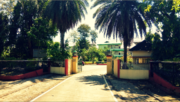
Leisure and entertainment
Golaghat offers required leisure and pleasure trips in and around the region. The place has tea processing units and other old landmarks and resorts, such as the Gymkhana and the Circuit House.
The Assam government has planned to launch the homestay scheme which will include building around sixty homestays to boost tourism in the Golaghat region.
Golaghat Gymkhana
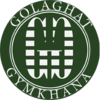
Golaghat Gymkhana is a public/private members' club located on Station Road in Golaghat. Consisting mostly the citizens of Golaghat, it is a heritage bungalow built in 1910 and is a clubhouse. 116–117 years old building had been renovated to convert into a modern clubhouse.
The present–day club, open to all, is equipped with a lounge bar along with a billiard table, a gymnasium and a swimming pool, besides a restaurant.
Although anyone may apply for the membership to avail 'members-only' facilities, such as the gymnasium, applications may be reviewed to make an informed decision.
Golaghat's heritage Gymkhana Club, then the centre of entertainment and merry-making for military personnels, much like Jorhat, was destroyed during the Quit India Movement.

Museum and heritage sites and buildings
Natural History Museum
Natural History (Robin's) Museum is located on Mission Road, and was the former place of residence of late Dr Robin Banerjee, a naturalist of international repute.
Full of artefacts, mementoes, movies and other personal collections of Banerjee's lifetime, the museum showcases 587 dolls and 262 other showpieces which had been presented by admirers and children during his trips to abroad and in the country.

Golaghat Baptist Church
Golaghat Baptist Church is one of the oldest and biggest Baptist churches in Assam that was established in December 1898, and had celebrated its centenary anniversary in 1999.

Golaghat British Cemetery
Golaghat British Cemetery, established in 1876, is located on the premises opposite to Cally Coomar Doss & Co., adjacent to the circle office of Assam Power Distribution Company Limited. It is Assam's one of the oldest burial grounds containing 28 burials of British officers of tea estates and their families and is open for public viewing.
Doss & Co.
Constructed in 1930 and incorporated 70–71 years ago as Cally Coomar Doss Co. Pvt. Ltd. under the Registrar of Companies (RoC) – Shillong in the year 1955, located at Krishna Building, the Golaghat Doss & Co. is the oldest Department Store, and the largest during that time, that was established before India's independence from Britain.

The general merchants' store belonging to entity of company with limited shareholders and an authorised capital of ₹500,000 and paid–up capital of ₹210,000, still stands to this day, trading in the same building at the heart of the city centre, having many divisions comprising home appliances, electronics, and additionally select other lines of products such as paint, hardware, toiletries, cosmetics, photographic equipment, jewellery, toys, and sporting goods, among others.

Having built long ago, and reckoned as the earliest department store in the organised retail space, and with a legacy of sixty plus years in the state of Assam, the store is one of the recommended places for tourists in Golaghat, and has an official Assam Travel Guide entry, issued and published by Assam Tourism under the Joint Secretary Finance of Tourism Departments, Assam Secretariat.
Two years later, a second branch of this store was opened in Jorhat in the year 1957. The company was incorporated on 1 March 1957 under the name of Jorhat Doss Co. Pvt. Ltd. marked by Registrar of Companies (RoC) – Shillong .
The two stores with an age difference of two years, and with the assigned registration numbers of 1063 and 1086 respectively, laid the first foundations of department stores in the region, establishing Doss & Co. – Golaghat as the thousand sixty–third and Doss & Co. – Jorhat, the thousand eighty–sixth, limited companies in Assam to be listed under the category of Trading as the principal business activity based on the classification of registered companies by the Ministry of Corporate Affairs, Government of India.
Deopahar ruins
A historical spot that has one of the finest sculptures of the pre-Ahom period. An important archaeological site in the state, located on the hills amidst the tropical forests, consisting the ruins of an ancient temple, and a vast range of sculptured stone blocks of pre-Cambrian rocks – the architectural style is of the later Gupta-era.
The archaeological site, situated in Numaligarh, is a protected by the Directorate of Archaeology, Government of Assam, India.
The site is atop a hillock called by the same name by the side of the National Highway 39. The hillock is a part of a forest reserve.
Music and art

Golaghat exerts a considerable impact upon the arts, music, education, entertainment of the region. It houses some of the oldest institutions of performing arts, and has produced many Assamese film directors and producers, such as Munin Baruah and Tapobrata Barua.
Defunct picture houses in Golaghat Urvashi Picture House Bengenakhowa – Golaghat (abandoned)
Urvashi Picture House Bengenakhowa – Golaghat (abandoned)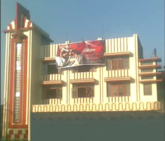 Chitralekha Picture House
Chitralekha Picture House Greater Arengapara – Golaghat (demolished)
Golaghat was home to early film houses, projecting celluloid prints for viewing films, such as the Uravashi and the Chitralekha picture houses. However, with the advent of multiplexes, these have now been either closed or demolished.
Golaghat Amateur Theatre Society
Golaghat Amateur Theatre Society (GATS), established in 1895, is the oldest theatre society in Assam having its own auditorium. Most of the seminars, conferences, theatres, including experimental theatres, meetings and other workshops in the city are organised and conducted by GATS.
Ajanta Kala Mandal
Established in 1951, the Ajanta Kala Mandal (Ajanta Arts Society) is one of the oldest centres of teaching and propagation of Sattriya – the classical dance form of Assam. Set up by Pradeep Chaliha, a trained and renowned dancer of Assam and an honorary D.Litt. title holder from Dibrugarh University, the Ajanta Kala Mandal has trained numerous classical dancers of Assam since its inception, including internationally acclaimed Sattriya dancer, Indira P.P. Bora. The institute continues to train dancers and organizes various cultural workshops for the promotion of arts and culture in Golaghat, and greater Assam.
Sadhani Kalakshetra
 Queen's Arts & Cultural Complex (view from galleries)
Queen's Arts & Cultural Complex (view from galleries) Queen's Arts & Cultural Complex (view from stage)
Queen's Arts & Cultural Complex (view from stage)
Sadhani Kalakshetra (Queen's Arts & Cultural Complex), a cultural center located near Tenpur suburb in the Narakanwar region of Golaghat is a leading modern cultural centre in Upper – Assam. Spread over ~ 10 acres of land, it includes an air-conditioned auditorium, a tourist lodge, boating facility, an amusement park and restaurants. and is named after Sati Sadhani, the last queen of the Sutiya dynasty. The centre supports and encourages the creative expression of the indigenous cultures of Assam, enabling the Assamese society to promote presentations on drama, music, dance, and arts and crafts, many of which having origins in Assam.
Designed and developed by Government of Assam, the cultural complex is set up with the specific mission to create, preserve, promote and educate about the passion and dedication of Sati Sadhani.
Recreation
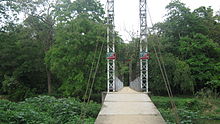


Parks and open spaces
Garampani Wildlife Sanctuary
Garampani Wildlife Sanctuary is a 6.05-square-kilometre (2.34 sq mi) wildlife sanctuary which is 25 km (16 mi) away from Golaghat. It is one of the oldest sanctuaries containing hot-water spring and waterfall, and surrounded is by Nambor Sanctuary having 51 rare species of orchid.
Kaziranga National Park
Kazirônga National Park is a World Heritage Site that hosts two-thirds of the world's great one-horned rhinoceroses. It has the highest density of tigers among protected areas in the world and was declared a tiger reserve in 2006. The park is home to large breeding populations of elephants, wild water buffalo, and swamp deer. Kaziranga is recognized as an important birds' area by BirdLife International for the conservation of avi-faunal species. Located on the edge of the Eastern Himalaya biodiversity hot-spot, the park combines high species diversity and visibility. It is a vast expanse of tall elephant grass, marshland, and dense tropical moist broadleaf forests, criss-crossed by four major rivers, including the Brahmaputra, and the park includes numerous small bodies of water. The park celebrated its centennial in 2005 after its establishment in 1905 as a reserve forest.
Nambor – Doigrung Wildlife Sanctuary
Nambor – Doigrung Wildlife Sanctuary, spreading across 97 square kilometres (37 sq mi) in 3 blocks, it is located in Morangi, Golaghat, and a popular spot for hot water spring and wildlife viewpoints for spotting Rhinos and other animals.
Walking
Dhansiri river bank
A walk down the Dhansiri bridge towards the river offers a very beautiful sight. It is a popular picnic spot for the citizens of Golaghat and others alike.
Jamuna boating park
A public boating park within the city with slow-boating facility for the citizens and tourists. It also has a jogging track with swings and dedicated playing area for children.
Jamuna botanical reserve
A reserved area adjacent to the boating park for the conservation of flora and fauna plantations. It is not open for public boating and has a recorded history of rich and exotic species of biological plant and animal species.
Japixôjia lake
The lake is about 30 minutes drive from central Golaghat and is a scenic spot with lush tea gardens lining the borders of the vast expanses of water. Visited by many migratory birds, it is also home to various all-seasons birds.
Melamora Eco Tea Tourism
Melamora Eco Tea Tourism is located about 15 km from Golaghat Town. Melamora tea tourism centre is covered by green surroundings and is covered by hundred bighas of land. It has a children park with various recreational activities and is a place for various migratory birds. Melamora beel has boating facility and is being managed by women of the locality.
Sport
Golaghat has hosted many national and regional sports events including major tennis tournaments, and is the only place in Assam to have Sports Authority of India – Sports Training Centre (STC) after Guwahati.
-
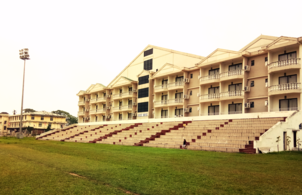 GDSA – Golaghat District Sports Association
GDSA – Golaghat District Sports Association
-
 Golaghat Premier League Cricket Tournament
Golaghat Premier League Cricket Tournament
-
 Golaghat 2019 Swimming Championship
Golaghat 2019 Swimming Championship
Golaghat District Sports Association (GDSA) is the highest sport governing body in the city and the greater district for promoting, mentoring, monitoring, regulating and organising all sporting events. It has many affiliated sub-associations and clubs.
- Stadium: equipped with a cricket pitch, basketball court, two boxing rings, and a football ground, having galleries with a sitting capacity of 4000 people, besides a twin-crease indoor cricket practice stadium built with materials imported from Australia.
- Indoor stadium: a table tennis and badminton indoor stadium with modern amenities.
- Swimming club: a training pool for all age groups to learn and purse the sport of swimming.
- Boxing club: one of the main centres for boxing events in the city.
- Golaghat Tennis Club (GTC): one of the oldest sport clubs in Assam, having qualified coaches, supported with modern infrastructure facilities, including floodlight. It has two courts, one at its premises, and the other at the Kushal Konwar Memorial Trust complex. The club has been organising championships and other AITA tournaments regularly since 1987.
- Golaghat District Carrom Association (GDCA): the platform for the carrom players of the district.
- Golaghat Rhino FC: a locally based professional football club competing in the Assam State Premier League, the top division state football.
Politics
The politics of Golaghat forms the major part of the wider politics of Assam. Golaghat was, and still is, an area of political and geographical importance and continues to provide the resources and the environment with the dignity and the political self-consciousness appropriate to a state capital.
Formation of AGP
Main article: Golaghat ConventionGolaghat is the birthplace of Assamese Political Renaissance, where the historic Golaghat Convention led to the formation of Assam's first major political party – AGP (Assam Gana Parishad).
AGP was a result of six-year's Assam Movement against illegal infiltration of foreigners from Bangladesh into Assam, led by All Assam Students Union (AASU). The long agitation ended with the signing of the Assam Accord on the independence day in 1985. The leaders of the Assam Agitation formed the AGP on 14 October 1985, in Golaghat and the party later that year overthrew the Indian National Congress led by late Hiteswar Saikia.
Golaghat is a part of Kaliabor (Lok Sabha constituency). BJP's Ajanta Neog is the current MLA of Golaghat (Vidhan Sabha constituency).
Notable people
This is a dynamic list and may never be able to satisfy particular standards for completeness. You can help by adding missing items with reliable sources.| Image | Name | Notes | |
|---|---|---|---|
| Aideu Handique | Assamese movie actress. | ||
| Ajanta Neog | Politician. | ||
| Atul Bora | Politician. | ||
| Chandradhar Barua | Writer, poet. | ||
| Debo Prasad Barooah | Academician, historian, ex-vice chancellor Gauhati University. | ||
| Gunaram Khanikar | Herbal medicines expert. | ||
| Hemchandra Goswami | Writer, poet, historian, teacher and linguist. | ||
| Hiren Gohain | Literary critic, social scientist. | ||
| Kushal Konwar | Indian independence activist. | ||
| Lovlina Borgohain | Boxer, Olympic Bronze medalist. | ||
| Munin Barua | Assamese film director. | ||
| Nagen Saikia | Writer. | ||
| Nilmani Phookan | Writer, poet. | ||
| Robin Banerjee | Padma Shri awardee, wildlife expert, environmentalist, painter, photographer and documentary filmmaker. | ||
| Syed Abdul Malik | Writer. | ||
Gallery
- Important landmarks of Golaghat
-
 Doss & Co., CIRCA 1930
Doss & Co., CIRCA 1930
-
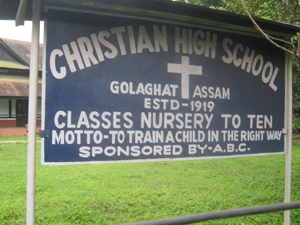 Christian High School, EST 1919
Christian High School, EST 1919
-
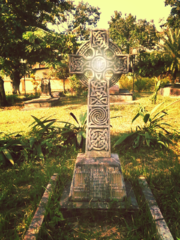 British Cemetery, EST 1876
British Cemetery, EST 1876
-
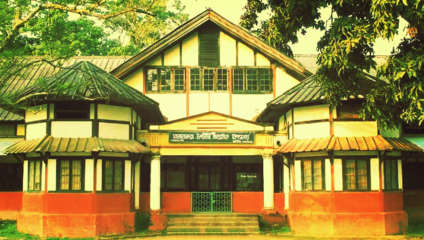 Bezbaruah H.S. School, EST 1886
Bezbaruah H.S. School, EST 1886
-
 Baptist Church, EST 1898
Baptist Church, EST 1898
-
 Golaghat Gymkhana EST 1910
Golaghat Gymkhana EST 1910
-
 Circuit House, CIRCA 1900
Circuit House, CIRCA 1900
-
 Stone plaques of Deopahar Ruins, AD 900
Stone plaques of Deopahar Ruins, AD 900
-
 Queen's Arts & Cultural Complex
Queen's Arts & Cultural Complex
See also
- Golaghat Baptist Church
- Golaghat Bar Association
- Golaghat British Cemetery
- Golaghat Commerce
- Golaghat Convention
- D. R. College
- Golaghat Bezbaruah Higher Secondary
- Golaghat Gymkhana
- Golaghat Municipal Board
- NETA (Golaghat)
- Golaghat Natural History Museum
- Golaghat Vidhan Sabha
- JNV Golaghat
- KV Golaghat
- Sacred Heart School
- VKV Golaghat
Notes
- In 1941, Mahendra Nath Barooah of Golaghat, the newly-elected Secretary moved the office to one of his cottages at Golaghat. The headquarters remained for nine years. Assam Tea Planters Association – About Us: http://www.atpa.in/about.html
- Spelled as in the book – A Glimpse of Assam
- Spelled as in the book – A Glimpse of Assam Population and Education, page 25
- Stations, page 67
A Glimpse of Assam - Stations, page 74 A Glimpse of Assam
- Amola, meaning Clerk, Amolapatty, meaning, neighbourhood of clerks, set up in Golaghat, Nowgong and Dibrugarh. Anglicized spelling Omlah or Amlah. Shodhak, Volume 6, Parts 1-3. Bhartiya Pragtisheel Shiksha Parishad. 1977. p. 86. Retrieved 1 December 2019.
- The sex ratio is the number of females per 1000 males in the population. Sex ratio of population in the age group 0-6.
- Distribution of workers by sex in four categories of economic activity in Towns, 2011, page 48
PART A DCHB GOLAGHAT - Number and Percentage of Scheduled Castes and Scheduled Tribes Population in Towns 2011, page 36
PART A DCHB GOLAGHAT - Proportion of slum population in towns, 2011, page 54
PART A DCHB GOLAGHAT - Number and Percentage of Literates and Illiterates by Sex in Towns, 2011, page 39
PART A DCHB GOLAGHAT - Economic Profile of Golaghat, page 6 PART A DCHB GOLAGHAT
- Economic Profile of Golaghat, page 6 PART A DCHB GOLAGHAT
Bibliography
- Ward, S. R. (1884). A Glimpse of Assam. 12 Bentinck Street, Calcutta: City Press: Thomas S. Smith. pp. 24, 25, 67, 74. ISBN 978-1-14-568011-1.
{{cite book}}: CS1 maint: location (link) - Sharma, Anil Kumar (2007). Quit India Movement In Assam. New Delhi: Mittal Publications. ISBN 978-8-18-324242-4.
- Swati, Mitra (2011). Assam Travel Guide. Goodearth Publications. p. 106. ISBN 978-9-38-026204-8.
References
- ^ Swati Mitra (2011). Assam Travel Guide. Goodearth Publications. p. 106. ISBN 9789380262048.
- Assam District Gazetteers: Sibsagar District, page42. Government of Assam – Education Department-date=11 Jan 2021. 1976.
- Brief History of The District, page12 (PDF). Directorate of Census Operations. 16 June 2014. Retrieved 16 June 2014.
- " "Central Pollution Control Board (CPCB), Ministry of Environment & Forests". Government of India. August 2014.
- "Assam Hooch tragedy: Death toll rises to 124, over 300 undergoing treatment". The Financial Express. 23 February 2019. Retrieved 28 November 2019.
- "'Want to Give BJP a Chance': Assam's Tea Tribes Back Modi". The Quint. 3 April 2019. Retrieved 28 November 2019.
- K. M. Mittal (1921). Report on the Administration of North East India.
- Rinku Manta; Dr. Jnanshree Borah (2005). "Urbanisation and Growth of Small Towns in Assam, India" (PDF). Archived from the original (PDF) on 26 October 2020. Retrieved 2 February 2017.
- Samudra Gupta Kashyap (26 June 2015). "Asked for 6 smart cities, got 7 AMRUT schemes, rues Assam CM Tarun Gogoi". The Indian Express.
- "River route to smart city – Meet stresses development of areas around Brahmaputra". The Telegraph. 22 November 2014. Archived from the original on 11 February 2015.
- "North East NextGen Cities Conclave Held, The Indigenous Herald". 22 November 2014.
- Sushanta Talukdar (29 January 2015). "Assam Congress promises smart towns ahead of municipal polls, The Hindu".
- Milli, Nitashree; Acharjee, Shukla; Konwar, M. (September–December 2013). "Impact of Flood and River Bank Erosion On Socio-economy: A Case Study of Golaghat Revenue Circle of Golaghat District, Assam". Geography. International Journal of Geology, Earth & Environmental Sciences. III (3): 180–185. ISSN 2277-2081.
- "Brief History of The District, page10" (PDF). Directorate of Census Operations. 16 June 2014. Retrieved 16 June 2014.
- "Sibsagar Bar Association
Extension of courts to the undivided Sibsagar District comprising the present day Golaghat, Jorhat and Sibsagar districts in 1839". - Ritupallab Saikia (19 January 2015). "AGP lists civic poll candidates". The Telegraph. Archived from the original on 30 June 2015. Retrieved 19 January 2015.
- A Glimpse of Assam
- Brief History of The District, page77 (PDF). Directorate of Census Operations. October 2011. Retrieved 16 June 2014.
- "Golaghat Amateur Theatre Society to Celebrate 125 Glorious Years". The Sentinel. 16 October 2019. Retrieved 28 November 2019.
- ^ "Golaghat Amateur Theatre Society: A Brief Introduction".
- Saikia, Ritupallab (8 September 2017). "Bar facilities". www.telegraphindia.com. The Telegraph (Calcutta). Retrieved 28 November 2019.
- Pullock Dutta (8 July 2013). "British officers buried in Golaghat cemetery". The Telegraph. Archived from the original on 10 January 2017.
- "Golaghat school completes 125 years". The Sentinel. 19 January 2016. Archived from the original on 18 August 2017. Retrieved 12 January 2017.
- Nagaland Post (29 September 2019). "A brief history of Christian High School, Golaghat (Centenary celebration: 1919-2019)". Nagaland Post.
- "List of Company Master Data of Assam up to 31st March 2015 with CIN (Corporate Identification Number) and Date of Registration under Registrar of Companies (RoC) – Shillong". Ministry of Corporate Affairs, Government of India. August 2017.
- Swati Mitra (2011). Assam Travel Guide. Goodearth Publications. p. 106. ISBN 9789380262048.
- "Success At Golaghat". Assam Tea Planters Association.
- ^ "Chamber of Commerce to celebrate diamond jubilee". The Sentinel. 15 September 2016.
- "Diamond jubilee celebration of UCC Golaghat". The Sentinel. 20 September 2016.
- Indranil Banerjie (17 January 2014). "Birth of AGP leads to Assam being divided into two irreconcilable camps". India Today.
- Gobin Medok (15 October 2013). "AGP sells regional dreams – Leadership avoids reference to rift in party, paints rosy picture at Foundation Day function in Dhemaji". The Telegraph. Archived from the original on 30 October 2003.
- Samir K. Purkayastha (15 October 2008). "AGP unification amid scepticism – Sections still unsure about party fortunes". The Telegraph. Archived from the original on 1 April 2018.
- "Barkakoty re-elected chairman of North Eastern tea association". Business Standard. 11 April 2013.
- "ACMS writes to tea growers on bonus". The Telegraph. 11 August 2016. Archived from the original on 12 August 2016.
- "Brief History of The District, page9" (PDF). Directorate of Census Operations. October 2011. Retrieved 16 June 2014.
- Sharma, Anil Kumar (2007). Quit India Movement In Assam. Mittal Publications. ISBN 978-81-8324-242-4.
- 佚名 著; 龚肃政 译; 杨永生 注. 银云瑞雾的勐果占璧简史. 勐果占璧及勐卯古代诸王史. 昆明: 云南民族出版社. 1988: 1–51. ISBN 7-5367-0352-X.
- (Scott 1967:17) harvcol error: no target: CITEREFScott1967 (help)
- (Laichen 2000:79)
- "Patents, seals, Imperial tallies and red warrants engraved with gold characters were conferred upon all of them. The Supervising Secretary Zhou Rang was sent to take the Imperial orders and go and confer them upon these people. Further, paper money and silks as appropriate, were conferred upon them all."(Wade 1994:302)
- The chieftains sent separately by Po-di-na-lang, the pacification superintendent of Da Gu-la; La-wang-pa, the pacification superintendent of Di-ma-sa; Bai-zhang, the chief of Xiao Gu-la; and Zao-zhang, the chief of Cha-shan, offered tribute of horses and local products in gratitude for the Imperial grace manifested in the conferring of posts upon them."(Wade 1994:432)
- "Paper money, ramie- silks, silk gauzes and thin silks as appropriate, were conferred upon ...the monk Hui Yuan from Yun-nan Prefecture; the chieftain Ma-zhi-a-sa, who had been sent by Die-dao Mang-pa, the husband of the younger sister of the deceased pacification superintendent of the Di-ma-sa Pacification Superintendency and acting head of the superintendency;"(Wade 1994:862)
- Plate was discovered in Jorhat Assam from Ahom royal family. ① 永樂五年: Yong-le emperor 5 years: 1407 AD. ② 信符: Plate. ③ 底馬撒宣慰司: Di-ma-sa Xuanwei Si ④ 皇帝聖旨: Imperial edict ⑤ 合當差發: "合當" means must or should, "差發" is a commercial form in the early Ming dynasty that frontier ethnic groups or tribes exchange horses for tea with Ming officials. "合當差發" could be understood as if you have this plate then you can exchange horses for tea with a Ming official. The Ming dynasty prohibits the folk tea trade with frontier ethnics and tribes. "合當差發" is the only way they can get tea from Ming. ⑥ 不信者斬: If somebody does not comply, he should be killed.
- "The Yan-anng-myin pagoda inscription at Themaungan, south of Pinya, claims that in 1400 A.D. the rule of the king extended beyond the Kandu (Kadu, an ethnic group in northern Burma) and the "Palaung who grow tails," to the "heretic kingdoms of the naked Nagas on the borders of Khamti Khun kyuiw, as far as the heretic kingdom called Timmasala where they kill people and turn into spirits." This Timmasala should be identified with the Dimasa Kacharis of Upper Assam."(Laichen 2000:21–22)
- "The Khaṁtī mentioned after Muiwkon (Mogaung) and Muin Can (Maing Zin) in the Kyankse Hill inscription (List 1084a 5, 955 s.), is doubtless Singkaling Khamti. The recently discovered Yan-aung-myin pagoda inscription at Thèmaunggan, south of Pinya (Obverse, line 8, 762 s.), claims that in 1400 A.D. the rule of the king extended beyond the Kandu (Kadu) and the Ponlon amri yols ("Palaungs who grow tails"), to the "heretic kingdoms of the Naked Nagas on the borders of Khamti Khun lcyviw (?), as far as the heretic kingdom called Timmasàla where they kill people and turn into spirits," i.e., the Dimasa Kacharis of Upper Assam."(Luce 1958:174) harvcol error: no target: CITEREFLuce1958 (help)
- "At, or shortly after, his formal ascension, Mingaung the First claimed in the same inscription noted above that "Myanma Pyi" extended on the east to "Shan Pyi," on the northwest to "Timmasala" (Assam?), on the west to "Kula Pyi," and on the south to "Talaing Pyi." What these entities might have been depends on the word pyi. Since Pagan times, the Old Burmese word pran (pyi) has been used in both a concrete, geopolitical and cultural sense (as it is here), as well as in an abstract way, such as in the phrase nibban pyi (the state of nirvana)."(Aung-Thwin 2017:71) harvcol error: no target: CITEREFAung-Thwin2017 (help)
- "On Tuesday the waxing of Tagu he captured the capital of Suiw Khut called Kale. On Thursday the 7th waxing of the month, he captured the Mo king Suiw Nam Phwa, own grandson of the lord of Nine Hundred Thousand, Suiw Khan Phwa (Thonganbwa), ruler of the 21 Umbrellas:- Muin Mo, Muin Nan; the ocean-ordered anklet wearing Kula (Indians) and Timmasala (Hill Kacharis); Muin Kale; Kasan (Manipur); Kakran (Kachin); Muin Tin; Muin Pran; Muin Ti; Muin Na; Muin Myan; Kyra Uiw; Muin Nuiw; Muin Luiw; Muin Saou; Muin Ya; Muin Khruin; Muin Khun; Muin Yuiw;........Many of these 'Umbrellas', i.e independent states can be identified :- Maw (Lu-ch'uan); Mohnyin (Mengyang); Kula and Dimasa; Kalemyo; Manipur; Kachin - these are unmistakeable"(Luce & Htway 1976:214) harvcol error: no target: CITEREFLuceHtway1976 (help)
- "Thonganbwa and the chief of Kale were soon afterwards taken by the governor (of Taungdwin) to the presence of King Narapadi, who was then sojourning in a temporary palace on Minwun hill, and on Sunday, the 12th waxing of Kason, several elephants and ponies and a quantity of jewellery obtained from Kale were presented to the king."(Nyein Maung 1998:38) harvcol error: no target: CITEREFNyein_Maung1998 (help)
- "Brief History of The District, page10" (PDF). Directorate of Census Operations. 16 June 2014. Retrieved 16 June 2014.
- Sharma, Anil Kumar (2007). Quit India Movement In Assam. Mittal Publications. ISBN 978-81-8324-242-4.
- ^ A Glimpse of Assam
- Ward, S. R. (1884). A Glimpse of Assam Population. p. 24. ISBN 978-1143013157.
- A Glimpse of Assam
- ^ A Glimpse of Assam
- Sharma, Anil Kumar (2007). Quit India Movement in Assam. pp. 24, 99, 113, 114, 229. ISBN 9788183242424.
- "The Assam Tribune Online". www.assamtribune.com. Retrieved 28 November 2019.
- Das, Sisir Kumar (2005). History of Indian Literature. Sahitya Akademi. ISBN 978-81-7201-006-5.
- "'Whenever I train, Olympics is right in my mind. It is my father's dream': Lovlina Borgohain". DNA India. 13 August 2019. Retrieved 28 November 2019.
- "Assam: Golaghat boy wins iconic Raid de Himalaya". NORTHEAST NOW. Retrieved 28 November 2019.
- "Inter District Wushu Championship: Assam Police, Golaghat, Dibrugarh finish top". The Sentinel. 7 August 2018. Retrieved 28 November 2019.
- "Assam Welcomes Centre's Decision against Privatisation of Numaligarh Refinery". News18. 21 November 2019. Retrieved 29 November 2019.
- "Numaligarh oil Refinery to foray into crude exploration in Assam". The Financial Express. 15 August 2019. Retrieved 29 November 2019.
- "Numaligarh Refinery to invest Rs 62 crore in CSR activities in Assam in 2019-20". Moneycontrol. Retrieved 29 November 2019.
- "Golaghat Development Authority".
- "Functions of Golaghat Development Authority". Archived from the original on 20 February 2017. Retrieved 26 February 2017.
- Shodhak, Volume 6, Parts 1-3. Bhartiya Pragtisheel Shiksha Parishad. 1977. p. 86. Retrieved 1 December 2019.
- Great Britain Parliament, House of Commons (1859). Parliamentary Papers, House of Commons and Command, Volume XIII. H.M. Stationery Office. p. 16. Retrieved 1 December 2019.
- Kamra, S. (2011). The Indian Periodical Press and the Production of Nationalist Rhetoric. Springer, 2011. pp. 57, 59. ISBN 9780230339552. Retrieved 1 December 2019.
- Falling Rain Genomics, Inc – Golaghat
- "India PIN Codes Directory, Bengenakhowa Pin Code".
- "India PIN Codes Directory, Missionpatty Pin Code".
- Sudipta Bhattacharjee (14 September 2016). "Hungry Rivers". The Telegraph. Archived from the original on 26 February 2017.
- "District Disaster Management Plan, Golaghat" (PDF). 2016.
- "Golaghat weather averages". worldweatheronline.com.
- "Weather statistics for Golaghat, Assam (India)". Norwegian Meteorological Institute and the Norwegian Broadcasting Corp. Archived from the original on 25 December 2019. Retrieved 29 January 2017.
- "Concern over poor air quality and traffic congestion in north – east cities; action must gather momentum". Centre for Science and Environment – New Delhi, India.
- "Golaghat Religion Data 2011". Census Population 2019 Data.
- "Census of India 2001: Data from the 2001 Census, including cities, villages and towns (Provisional)". Census Commission of India. Archived from the original on 16 June 2004. Retrieved 1 November 2008.
- Sex Ratio of Population in the Age Group 0-6 for Sub-district, 2011 page 33 (PDF). Directorate of Census Operations. 16 June 2014. Retrieved 16 June 2014.
- "Golaghat Religion Data 2011". Census Population 2019 Data.
- Barpujari, H. K. (1990–1993). The Comprehensive History of Assam. Vol. V. Guwahati: Publication Board, Assam. p. 147.
- Dawson, J. A. "Report of the Provincial Banking Enquiry Committee". Report of the Provincial Banking Enquiry Committee, 1920–1930: 78, 79.
- Bora, Babita (23 March 2011). "Banking History". Dainik Janambhumi.
- Economic Profile of Golaghat, page 6 (PDF). Directorate of Census Operations. 16 June 2014. Retrieved 16 June 2014.
- Ritupallab Saikia (23 September 2011). "NETA demands recognition of tea as state drink of Assam".
- "Tea boutiques to showcase garden fresh Assam tea; pilot project in Golaghat". NORTHEAST NOW. Retrieved 30 November 2019.
- "A Brief Note on the small Tea Growers Convention at Golaghat on 11th June' 2012". www.teaboard.gov.in. Retrieved 30 November 2019.
- Anand, Manoj (26 July 2019). "Assam: Perfume industry gets boost as govt ends agar tree curbs". The Asian Age. Retrieved 30 November 2019.
- Singh, Bikash (23 July 2019). "BJP-led government has liberated the Agar trade in Assam". The Economic Times. Retrieved 30 November 2019.
- "Assam Agarwood Planters, Traders Hail Cabinet Decision". The Sentinel. 24 July 2019. Retrieved 30 November 2019.
- "Assam relaxes curbs on Agar tree cultivation, felling". Outlook Publishing (India) Pvt. Ltd. Retrieved 30 November 2019.
- "State Highways | Public Works (Roads) | Government Of Assam, India". pwdroads.assam.gov.in. Retrieved 29 November 2019.
- "COMMUNICATIONS | Golaghat District | Government Of Assam, India". Archived from the original on 19 August 2019.
- "Rs 11cr for two-lane Golaghat highway - Telegraph India".
- "No. 1 Town Model LP School, icbse.com".
- "Golaghat Government Bezbaruah HS School observes 133rd Foundation Day". The Sentinel. 22 November 2019. Retrieved 28 November 2019.
- Dogra, R. S. D. (2004). Nation Keepers: Central Reserve Police Force (CRPF). New Delhi: APH Publishing. p. 68. ISBN 978-81-7648-606-4.
- Mitra, Swati (2011). Assam Travel Guide. New Delhi: Eicher Goodearth Publications. p. 107. ISBN 978-93-80262-04-8.
- Press Trust of India, PTI (8 January 2017). "Assam set to launch home-stay scheme to tap rural tourism". The Indian Express. Retrieved 2 December 2019.
- Pullock Dutta (29 April 2013). "Golaghat gets a place of pride". The Telegraph. Archived from the original on 4 April 2016.
- "All Inclusive 5* Hotel Resort, Ultimate Hotel Guide".
- "Golaghat Gymkhana Resort, travelguru – The Hotel Experts".
- Anil Kumar Sharma (2007). "Quit India and Student and Woman Movements in Golaghat District". Quit India Movement in Assam. Mittal Publications. p. 123. ISBN 978-81-8324-242-4.
- Richard, Johnston (20 June 2018). As Honest as the Day is Long: The True Story of Rev. Phandeo. Amazon Digital Services LLC - KDP Print US. ISBN 978-1-64324-353-5.
- "List of Company Master Data of Assam up to 31st March 2015 with CIN (Corporate Identification Number) and Date of Registration under Registrar of Companies (RoC) – Shillong". Ministry of Corporate Affairs, Government of India. August 2017.
- ^ "India – Companies – CALLY COOMAR DOSS CO PVT LTD". Company Data India. August 2017.
- "Companies registered under Registrar of Companies (RoC) under Companies Act, 1956, 2013 and other allied Acts, Bills and Rules". Ministry of Corporate Affairs (MCA), Government of India. August 2017. Archived from the original on 18 August 2017. Retrieved 17 August 2017.
- "Companies registered under Registrar of Companies (RoC) under Companies Act, 1956, 2013 and other allied Acts, Bills and Rules". Ministry of Corporate Affairs (MCA), Government of India. August 2017. Archived from the original on 18 August 2017. Retrieved 17 August 2017.
- Assam Travel Guide, Heritage Buildings of Golaghat. Assam Tourism in collaboration with Joint Secretary Finance of Tourism Departments, Assam Secretariat. 2011. pp. 106–107. ISBN 9789380262048.
- "Companies registered under Registrar of Companies (RoC) under Companies Act, 1956, 2013 and other allied Acts, Bills and Rules". Ministry of Corporate Affairs (MCA), Government of India. August 2017. Archived from the original on 18 August 2017. Retrieved 17 August 2017.
- "List of Company Master Data of Assam up to 31st March 2015 with CIN (Corporate Identification Number) and Date of Registration under Registrar of Companies (RoC) – Shillong". Ministry of Corporate Affairs, Government of India. August 2017.
- "India – Companies – JORHAT DOSS CO PVT LTD". Company Data India. August 2017.
- "CALLY COOMAR DOSS & CO PVT LTD". Zauba Technologies & Data Services Private Limited. February 2017.
- "JORHAT DOSS & CO PVT LTD". Zauba Technologies & Data Services Private Limited. February 2017.
- "Classification And Registration of Companies". Ministry of Corporate Affairs (MCA), Government of India. August 2017. Archived from the original on 18 August 2017. Retrieved 17 August 2017.
- Assam Travel Guide. Goodearth Publications. 2011. ISBN 978-93-80262-04-8.
- "Teller of common tales personality Personality- Munin Barua". The Telegraph. 11 November 2004.
- "Bowari maker passes away". The Telegraph. 21 March 2018.
- "Warts show up in first cinema survey - Condition of halls in Assam, not militant ban on Hindi cinema, responsible for decline". www.telegraphindia.com. Retrieved 21 February 2020.
- "Antareen has tough battle ahead". www.telegraphindia.com. Retrieved 21 February 2020.
- "Exit, celluloid prints from cinemas - Satellite-enabled digital sharing brings Assam halls back from the dead". www.telegraphindia.com. Retrieved 21 February 2020.
- Ritupallab Saikia (19 June 2014). "Golaghat to witness new theatre". The Telegraph. Archived from the original on 12 August 2014. Retrieved 20 June 2014.,
- Sharma, Anil Kumar (2007). Quit India Movement in Assam. p. 6. ISBN 978-81-8324-242-4.
- "Pradeep Chaliha, Sangeet Natak Academy". National Academy of Music, Dance and Drama, Government of India.
- "Indira P.P. Bora and Research and Development of Sattriya Dance".
- Ritupallab Saikia (23 July 2009). "Closing ceremony of the 20-day cultural workshop at Ajanta Kala Mandal in Golaghat". The Telegraph. Archived from the original on 1 April 2018. Retrieved 23 July 2009.
- Ritupallab Saikia (10 February 2018). "Queen's complex". The Telegraph. Archived from the original on 1 April 2018. Retrieved 1 April 2018.
- "Birangana Sadhani Kalakshetra inaugurated in Golaghat". The Sentinel. 10 February 2018.
- "Khumtai Tourism - Places".
- "Tennis debut for Assam Police". The Telegraph. 12 December 2004.
- "AATA schedule announced". The Assam Tribune. 17 September 2019. Archived from the original on 22 September 2019. Retrieved 20 November 2019.
- "Golaghat to get new stadium". The Telegraph. 21 April 2013.
- "Junior Boys & Girls Boxing Championship In Golaghat". The Sentinel. 16 March 2019. Retrieved 28 November 2019.
- "Golaghat to get new stadium". www.telegraphindia.com. Retrieved 28 November 2019.
- Longley, Philip R. H. (1969). Tea Planter Sahib: The Life and Adventures of a Tea Planter in North East India. Tonson Publishing House.
- Chandra Nath Boruah (2009). Assamese Response To Regionalism. Mittal Publications. p. 85. ISBN 9788183242813.
- Sushanta Talukdar (6 March 2006). "Shourie wants AGP-BJP tie-up". The Hindu.
- Chopra, Joginder Kumar (1989). Politics of Election Reforms in India. p. 273. ISBN 9788170991038.
- Ritupallab Saikia (15 October 2008). "AGP reunified at Golaghat". Assam Times.
- Sushanta Talukdar (15 September 2015). "AGP splits, Mahanta floats new party". The Hindu. Archived from the original on 9 May 2009.
- Tejesh Kumar (15 October 2016). "AGP fights citizenship bill – Party wants migrants to be detected and deported". The Telegraph. Archived from the original on 20 October 2016.
- "List of Parliamentary & Assembly Constituencies" (PDF). Election Commission of India. Archived from the original (PDF) on 4 May 2006.
- Tirkey, Anjali. "Aideu bids adieu". The Telegraph. Retrieved 1 December 2019.
- Saha, Abhishek (2 September 2019). "Across Assam, chorus rises among MLAs: NRC is faulty, many genuine citizens out". The Indian Express. Retrieved 1 December 2019.
- Correspondent, Special. "AGP dissidents for leadership change". The Telegraph. Retrieved 1 December 2019.
{{cite web}}:|last=has generic name (help) - Sarma, Anjali (1990). Among the Luminaries in Assam: A Study of Assamese Biography. Mittal Publications. ISBN 978-81-7099-207-3.
- Correspondent, Telegraph. "Former GU VC passes away". The Telegraph. Retrieved 1 December 2019.
{{cite web}}:|last=has generic name (help) - Kashyap, Samudra Gupta (7 January 2016). "Assam's herbal medicine expert Gunaram Khanikar dies at 69". The Indian Express. Retrieved 1 December 2019.
- Borthakur, Robin. "Adventurer in life and death". The Telegraph. Retrieved 1 December 2019.
- Datta, Amaresh (1988). Encyclopaedia of Indian Literature: Devraj to Jyoti. Sahitya Akademi. p. 1435. ISBN 978-81-260-1194-0.
- Hazarika, Sanjoy Kr. "Golaghat cops renovate Kushal Konwar's lock-up". The Assam Tribune. Retrieved 1 December 2019.
- "Lovlina Borgohain Becomes First Woman Boxer from Assam to Qualify for Olympics".
- "Teller of common tales personality Personality- Munin Barua". The Telegraph. Retrieved 1 December 2019.
- Correspondent. "Golaghat Ratna Award conferred". The Assam Tribune. Retrieved 1 December 2019.
{{cite web}}:|last=has generic name (help) - "Padmanath Vidyabinod Memorial Awards". Ramanath Bhattacharya Foundation. Retrieved 1 December 2019.
- "Wildlife expert Robin Banerjee dead". Zee News. 6 August 2003. Retrieved 1 December 2019.
- Hoque, Md. Mohibul (April 2013). "Credits of Syed Abdul Malik in Assamese Novel: A brief discussion" (PDF). Global Research Methodology Journal. VIII: 7.
Bibliography
- Laichen, Sun (2000), Ming -Southeast Asian overland interactions, 1368--1644.
- Wade, Geoffrey (1994), The Ming Shi-lu (Veritable Records of the Ming Dynasty) as a Source for Southeast Asian History -- 14th to 17th Centuries, Hong Kong
{{citation}}: CS1 maint: location missing publisher (link)
External links
Government
- Golaghat District Official Website
- Government of Assam – Golaghat
- Golaghat Higher Judiciary
- Bar Association of Golaghat
| Places adjacent to Golaghat | ||||||||||||||||
|---|---|---|---|---|---|---|---|---|---|---|---|---|---|---|---|---|
| ||||||||||||||||
- [REDACTED] Definitions from Wiktionary
- [REDACTED] Media from Commons
- [REDACTED] News from Wikinews
- [REDACTED] Quotations from Wikiquote
- [REDACTED] Texts from Wikisource
- [REDACTED] Resources from Wikiversity
 Travel guides from Wikivoyage
Travel guides from Wikivoyage- [REDACTED] Data from Wikidata